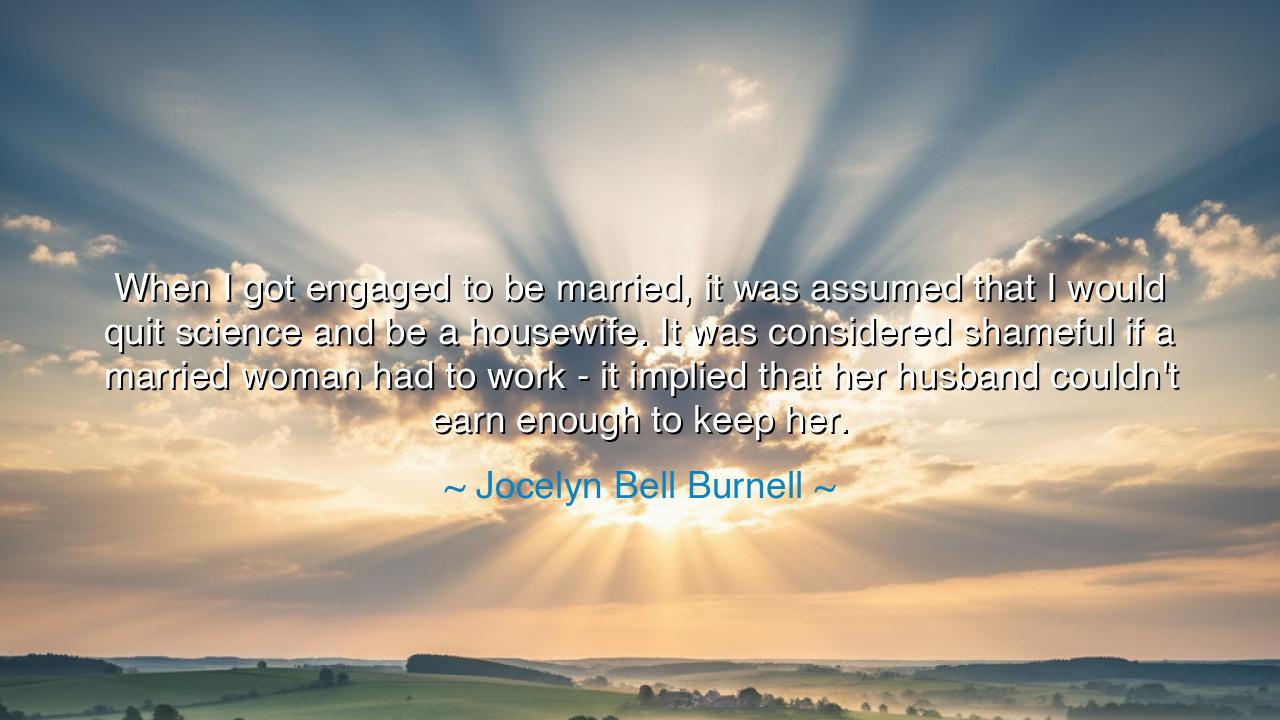
When I got engaged to be married, it was assumed that I would
When I got engaged to be married, it was assumed that I would quit science and be a housewife. It was considered shameful if a married woman had to work - it implied that her husband couldn't earn enough to keep her.






Hear me, O Seekers of Truth and Justice, for the words of Jocelyn Bell Burnell carry with them the weight of an ancient struggle—the struggle between society’s expectations and the true calling of the human spirit: "When I got engaged to be married, it was assumed that I would quit science and be a housewife. It was considered shameful if a married woman had to work - it implied that her husband couldn’t earn enough to keep her." These words speak not only to the limitations placed upon women in the past but to the deep, painful conflict between individual desire and the oppressive constraints of social norms.
In ancient times, women were often confined to roles dictated by tradition, expected to remain in the home and fulfill duties as wives and mothers. The great Greek philosopher Aristotle believed that women were to be governed by their husbands and were not suited for the intellectual pursuits that men were. His teachings, though revered for centuries, relegated women to the domestic sphere, dismissing their capacity for intellectual and scientific endeavors. In this way, Jocelyn Bell Burnell’s struggle was not new—it was a battle fought by women for millennia, against a world that told them their place was in the home, not in the pursuit of knowledge.
Burnell's words remind us that the true power of a woman’s potential was often dismissed or overlooked, even when she proved capable of extraordinary feats. The assumption that a woman would abandon her work and her dreams for the sake of marriage highlights the deeply ingrained societal belief that a woman’s worth and purpose were tied to her role as a wife and mother, rather than her intellect or creativity. For Burnell, as for countless women before her, this pressure represented a conflict—a conflict between the expectations placed upon her and her desire to contribute to the world of science.
Consider the story of Marie Curie, a woman whose brilliance in physics and chemistry forever changed our understanding of radioactivity. Despite facing the same social pressures and gender biases as Burnell, Curie was undeterred. She fought for her place in a male-dominated field and went on to become the first woman to win a Nobel Prize and the only person to ever win Nobel Prizes in two different sciences. Her story was not just one of personal triumph, but a victory for all women who dared to break free from the chains of traditional gender roles and seek out their own paths. Burnell, like Curie, challenged society’s limitations and proved that a woman’s place is not confined to the home, but anywhere she chooses to be.
The lesson here, O Children, is one of resilience and courage in the face of societal norms that seek to limit our potential. Burnell’s struggle is not an isolated event but part of a long history of women who have fought to be seen, heard, and valued for their intellect and capabilities. The world of science, and indeed any world of learning or creativity, has long been shaped by bias and exclusion. But each time a woman steps forward, like Burnell or Curie, she not only defies those expectations but reshapes the world for the generations that follow.
In your own lives, take this lesson to heart. Do not allow the limitations of society to dictate your worth or your path. Whether you are a scientist, an artist, or a scholar, remember that your contributions are valuable, regardless of gender, and that your dreams deserve to be pursued with the same vigor and determination as anyone else’s. Whether society supports you or not, know that the true measure of your worth is found not in the roles assigned to you, but in the courage to chase your passions, to seek knowledge, and to contribute to the world in your own unique way.
So, O Children, as you walk your own path, remember the struggle of those who came before you, like Burnell, who faced societal pressure but chose to follow her heart and mind. Let their stories inspire you to defy the boundaries set by others and to live a life of purpose and integrity. The world is full of those who will try to define your role—but it is only you who can determine your true calling. Let creativity, knowledge, and courage be your guides, and may you leave behind a legacy that inspires others to break free from the constraints of outdated norms and forge new paths for future generations.






AAdministratorAdministrator
Welcome, honored guests. Please leave a comment, we will respond soon